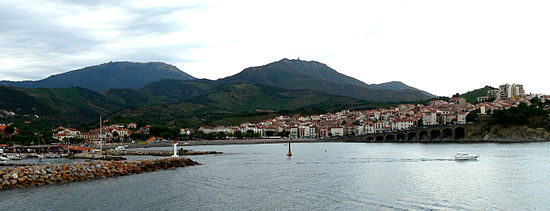Banyuls-sur-Mer
Banyuls-sur-Mer | |
|---|---|
| Country | France |
| Arrondissement | Céret |
| Canton | Côte Vermeille |
| Time zone | UTC+01:00 (CET) |
| • Summer (DST) | UTC+02:00 (CEST) |
| INSEE/Postal code | 66016 / |
Banyuls-sur-Mer (Catalan: Banyuls de la Marenda) is a French municipality in the département of Pyrénées-Orientales in the région of Languedoc-Roussillon. The town has 4,532 inhabitants and covers an area of 42.34 km² (16.35 sq mi).
Geography
Banyuls-sur-Mer is neighbored by Cerbère, Port-Vendres, Argelès-sur-Mer and Collioure. The region is known for its wines, such as the sweet wine Banyuls. An aquatic museum with aquarium is located in the town. The foothills of Pyrenees, the Monts Albères, run into the Mediterranean Sea in Banyuls-sur-Mer, creating a steep cliff line.
Name
Banyuls-sur-Mer was first mentioned in 981 as Balneum or Balneola. In 1074, the town starts being called Bannils de Maritimo in order to distinguish it from Banyuls-dels-Aspres, which lies 20 km away. In 1197, the town is mentioned as Banullis de Maredine and in 1674. In Catalan, it has been called Banyuls de la Marenda, since the 19th century.
The name Banyuls indicates the presence of a pond. In fact, a pond did it exist in Banyuls-sur-Mer until the creek Vallauria was drained in 1872. The term Marenda in Catalan or sur Mer in French merely indicates the proximity to the coast.
History

For nearly two centuries, the smuggling of goods to and from Spain was a major activity in Banyuls-sur-Mer. Depending on the needs of the time, salt, tobacco, silver, sugar, rice, textiles, and leather were smuggled through this city, almost always with impunity. Otherwise the inhabitants lived mainly from fishing and viticulture. Nowadays, tourism stemming from the wine industry plays a significant economic role in the town notably for delicious and rare red dessert wines
Miscellaneous
- Aristide Maillol, French sculptor and painter, comes from Banyuls-sur-Mer
- Banyuls-sur-Mer is the eastern end of the GR 10 long distance footpath

